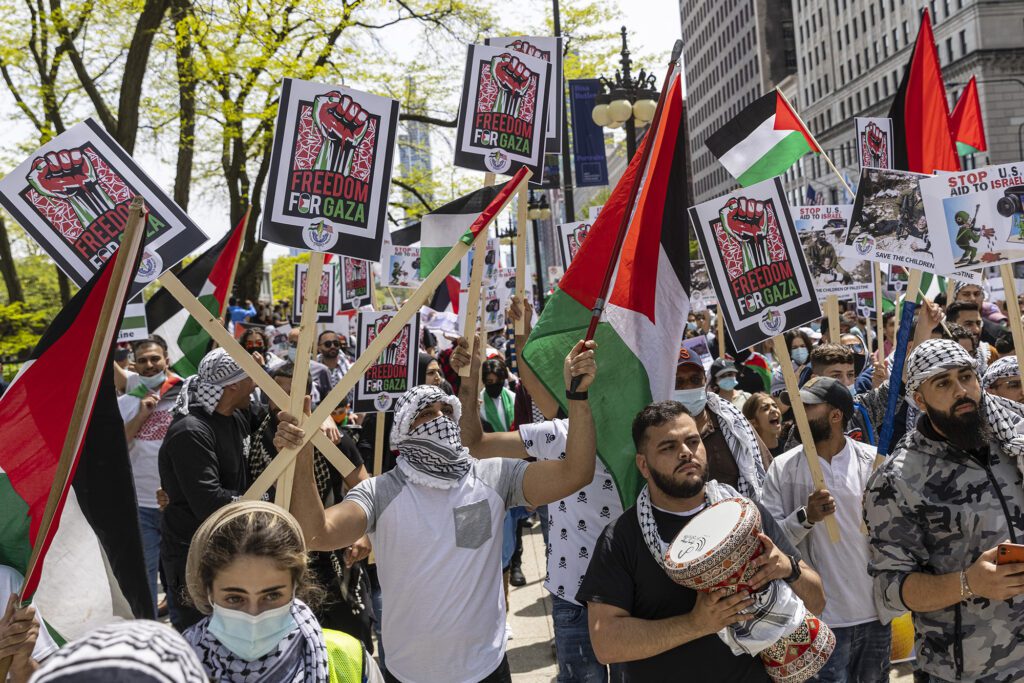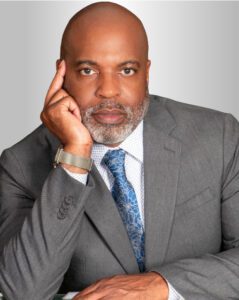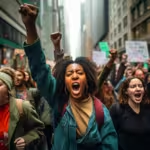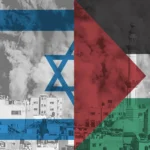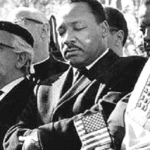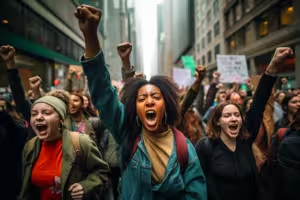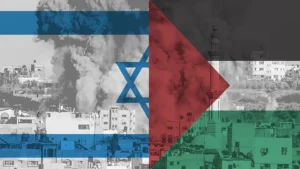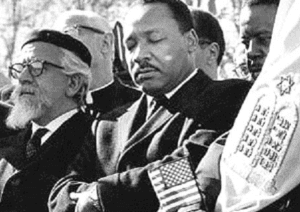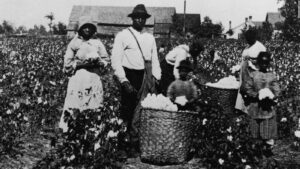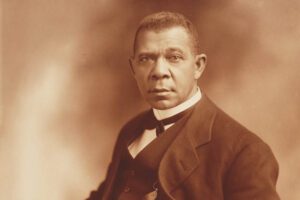Parallel Histories of Dispossession: Lessons from Indigenous America, Jim Crow, and Palestine
By Dr. Mario D. Wallace
The story of displacement, marginalization, and the fight for self-determination links Indigenous Americans, African Americans under Jim Crow, and Palestinians today. Each of these communities, in their respective eras, has faced systemic denial of rights and displacement. From the 1830 Indian Removal Act to the disenfranchisement of Black Americans during Reconstruction and Jim Crow, and from the 1948 displacement of Palestinians to the ongoing crisis in Gaza, parallels abound in these histories of dispossession. As the U.S. plays a central role in the Israeli-Palestinian conflict, American leaders—including Vice President Kamala Harris—face scrutiny, especially amid shifting public opinion and the evolving media landscape.
Dispossession in Historical Context: Indigenous America, Jim Crow, and Palestine
The forced removal of Indigenous people from their lands in the 1830s under the Indian Removal Act was an official government policy aimed at expanding European settlements. This displacement, often violent and disruptive, severed the cultural and spiritual ties of Indigenous nations to their ancestral lands. Likewise, Black Americans faced systemic exclusion, despite promises of equality during Reconstruction. Policies supporting segregation and disenfranchisement through Jim Crow laws confined Black Americans to a status of second-class citizenship, limiting their economic and social freedoms.
In 1948, as Israel was established, hundreds of thousands (700,000) of Palestinians were displaced. Their situation mirrors the denial of autonomy and second-class citizenship experienced by Indigenous Americans and Black Americans under Jim Crow.
Reconstruction and Jim Crow: Unkept Promises to Black Americans
The Reconstruction era promised a new beginning for Black Americans following the Civil War. Policies such as the Freedmen’s Bureau and attempts at land redistribution aimed to create opportunities for freed people. However, the collapse of these initiatives and the imposition of Jim Crow laws entrenched a new era of disenfranchisement, violence, and forced segregation. Black Americans were left to struggle with broken promises, mirroring the forced removal of Indigenous populations and fostering cycles of inequality that continue today.
The legacies of forced removal, betrayal, and systemic discrimination lay the groundwork for understanding the impacts of occupation and displacement seen in other parts of the world, including the Palestinian territories.
The Palestinian Displacement and the Gaza Conflict
In 1948, the establishment of Israel led to the forced removal of hundreds of thousands of Palestinians from their homes, sparking a conflict that endures to this day. Palestinians have since lived in refugee camps, under occupation, and in areas with strict restrictions on their movement, resources, and opportunities. For Palestinians in Gaza, the situation remains especially dire. Surrounded by a blockade, with limited access to essentials like clean water, electricity, and medical supplies, their living conditions echo the legacy of exclusion and forced removal faced by Indigenous Americans and Black Americans under Jim Crow laws.
The continued United States support for Israel—including military aid—fuels a perception that America enables or endorses this displacement and discrimination. This has caused international tension and criticism, especially in countries that view Palestinian plight through the lens of their struggles against colonialism and displacement.
America’s Role in the Conflict
The United States has long been Israel’s primary ally, providing billions of dollars annually in military aid and vetoing United Nations resolutions critical of Israeli policies. This alignment has strengthened Israel’s military stance but has also intensified global criticism of the United States, particularly as many see American support enabling the ongoing occupation and blockade in Gaza. As public opinion in the U.S. begins to shift—especially among younger generations and people of color—American leaders like VP Kamala Harris are facing new challenges.
VP Kamala Harris, who has often highlighted her heritage as a child of immigrants, is now under pressure to navigate this complex terrain. With growing demands for the U.S. to adopt a more balanced stance on the Israel-Palestine conflict, her position could influence her prospects for a presidential run. Many in the Black and Brown communities in America, who identify with the struggle of Palestinians, hope for a shift in U.S. policy that could acknowledge these parallels of historical dispossession and push for a viable solution for peace.
Jewish American Sentiment on Netanyahu and Policy Implications
Within the U.S., support for Israel does not equate to blanket approval for Prime Minister Benjamin Netanyahu’s policies. Recent polling has shown that many Jewish Americans disagree with Netanyahu’s hardline stance, viewing his approach as counterproductive to long-term peace. Many Jewish Americans support a two-state solution and express concerns about the humanitarian crisis in Gaza, fearing that Netanyahu’s policies only exacerbate tensions and weaken Israel’s moral standing globally. This divide within the Jewish American community is significant, as it could reshape political support for pro-Israel policies, especially if leaders like Harris consider presidential runs with a more progressive platform on this issue.
Media Censorship and the Lack of Palestinian Support
The media landscape in the U.S. has been largely unbalanced in coverage of the Israel-Palestine conflict, often portraying Israel in a sympathetic light while underreporting Palestinian perspectives. This skewed portrayal has hindered the ability of pro-Palestinian activists to gain support or bring attention to the humanitarian issues in Gaza. Many journalists and activists report facing censorship, shadow bans on social media, or even job loss for expressing support for Palestinian rights. As more Americans begin to question these narratives, media organizations may face growing demands for equitable reporting on the issue.
For VP Harris, a more transparent media environment might complicate her ability to maintain a centrist stance. If coverage continues to show the hardships faced by Palestinians, it may influence public opinion—and, by extension, the policy positions she and other leaders take as they consider broader political ambitions.
Prospects for Peace: A Hopeful Yet Uncertain Future
The question of whether Palestinians will ever see a peaceful resolution is complex and deeply uncertain. While diplomatic efforts have often aimed at establishing a two-state solution, the continuous expansion of settlements, coupled with systemic restrictions on Palestinians in Gaza and the West Bank, make this goal appear increasingly distant. For many Palestinians, the possibility of peace seems tied to global acknowledgment of their plight and a reevaluation of international support for Israel’s current policies.
VP Harris and other leaders face the challenge of acknowledging these parallels without alienating key allies or constituencies. As the conversation about Palestinian rights gains traction in American society, the path toward peace could demand greater accountability from the U.S., creating an opportunity for VP Harris to champion a more equitable and just approach in the Middle East.
A Time for Reflection and Change
The United States’ history of dispossession is woven deeply into the fabric of American policy, both domestically and abroad. The stories of Indigenous Americans, African Americans, and Palestinians demonstrate the far-reaching consequences of broken promises and forced displacement. As the political landscape shifts, figures like VP Harris face the challenge of reckoning with these histories—and with their implications on today’s policies. The path to the presidency may well hinge on how U.S. leaders address these deeply rooted injustices, offering hope for new approaches that prioritize peace, equity, and accountability.

